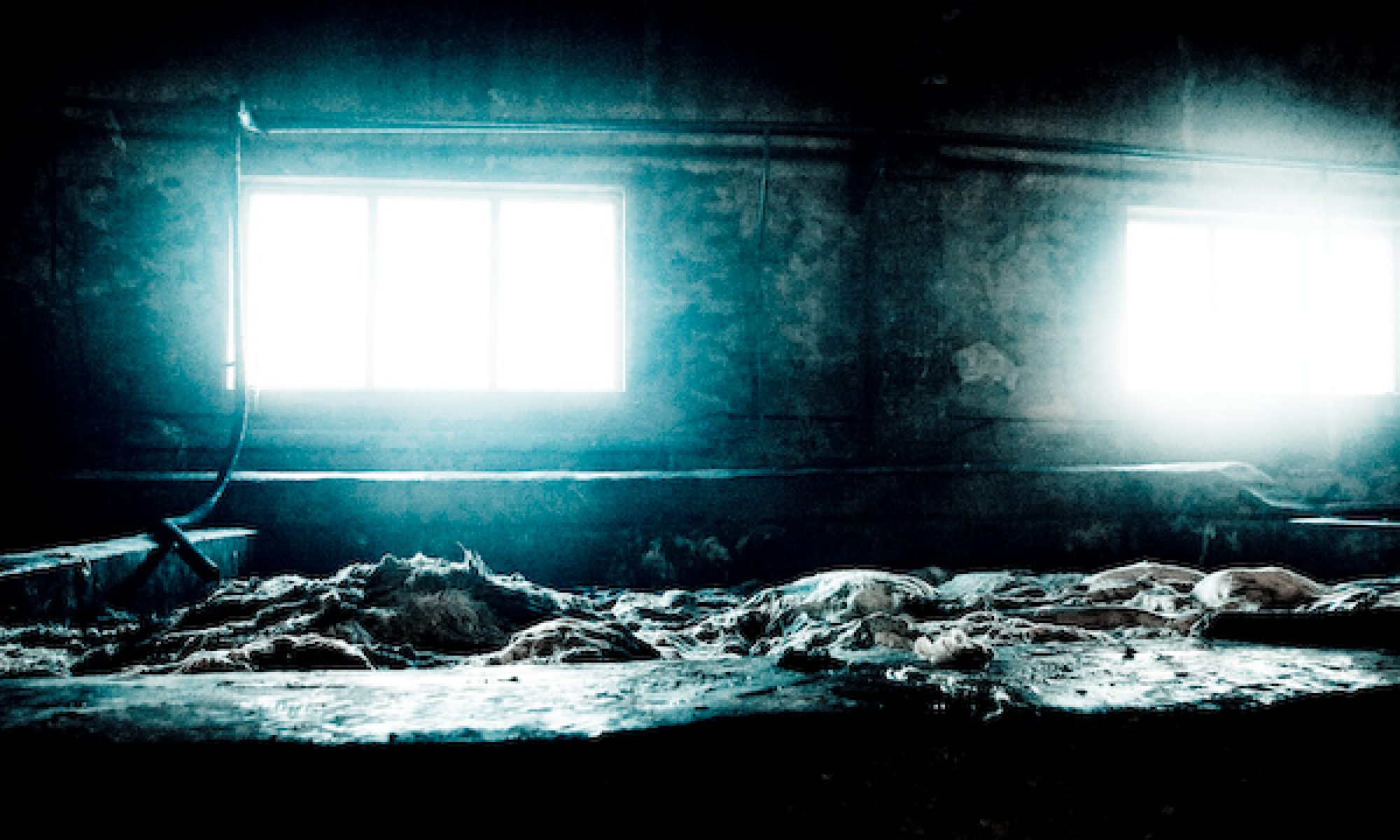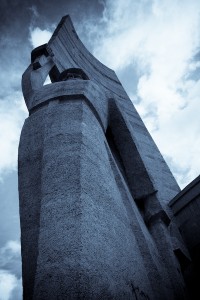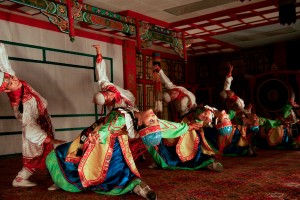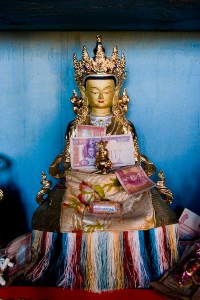Meta-Travel. Always slightly
Above, floating feet
Not quite touching the dusty ground._
Flip through the study-abroad brochures advertising semesters in Prague, Vienna, Amsterdam. Flip to the next page.
Now you are in the Exotic section. Beijing, Hangzhou, Dakar, Yaoundé. Wish you hadn’t dropped Chinese. It couldn’t have been _that_ bad.
The Dark Continent and the Exotic East, like two stepchildren. Appreciated intellectually, but when it comes down to the wire, people’s loyalties reveal themselves, and align conveniently with the flows of capital and genealogy.
You have narrowed your selection to two choices: Vietnam or Mongolia. Or Nepal. But you eliminate that because you’ve been, if only briefly. Feel bad for not wanting more to go to Africa. You must be an Orientalist asshole, or something. Make a note to work on that.
Vietnam, home of rice paddies and shards of American shrapnel embedded in jungle soil.
Mongolia is nowhere, nothing. Marco Polo and Genghis Khan. He is still Genghis to you.
Mongolia gives new weight to the phrase “Golden Years”. Nostalgia on a new plane.
But _now’s your chance_ to see Vietnam. _Before it develops_ they say.
Realize there is something morbidly fascinating about (post)-communism.
Choose Mongolia because you get to spend two weeks herding sheep and goats, and living in a yurt in the countryside. This appeals to you, but seems to be lost on others.
Develop some stock answers to the question, _Why Mongolia?_ Your favorites are: _Why not?_ or even better, _Because it’s fucking awesome, that’s why._ Deliver these with an air of definite confidence, as if the subject should require no further exploration.
you become a minor celebrity in certain circles. Your mom’s email list. Your sister’s friends. Relatives. No-one at your school cares, or they hide it well. It is likely they resent you for out-exoticizing-internationalizing them. This makes you happy.
Go away–far, far away. You are tired of living comfortable. Which is ironic, since for a rich white male, you’ve had it less than _easy_. Then again, that’s not saying much. You long for culture shock. To be hung by your feet and shaken until everything falls from your pockets.
_You are going to Mongolia_. Repeat 3 times. The words fail to become any less surreal. Two months later, you will echo this experience in downtown Ulaanbaatar, _You are in Mongolia_. Repeat 3 times.
Upon that first encounter with the infamous phantom
That is Montezuma’s Revenge.
Or the sting of your hands,
As they freeze one morning
In October.
PART I.TURBULENCE
With perestroika and the decline of Soviet power in the late 1980’s, Mongolia entered the first period of its post-communist development. This romantic period was a time of hope; Mongolia was to become the next Asian Tiger. Yet with the dissolution of the Soviet Union, and the halting of related aid money, newly democratic Mongolia was faced with an economic crisis of epic proportions. The fruits of democracy were enjoyed as well; newspapers sprang up, their variety reflecting the budding of Mongolia’s new multi-party democracy. Churches tripped over each other to send missionaries to cultivate her fertile sands, and Buddhism re-entered the public sphere. However, the lack of visible progress led many Mongolians’ to enter into state of now-familiar disillusionment.
Elections brought the young Democrats into power, who hastily implemented an intensely neo-liberal plan to shock the Mongolian economy into complete liberalization. Despite optimistic forecasts from policymakers, the life of the average Mongolian took a serious turn for the worse. Problems that had been forgotten during the times of Stalinist ‘utopia’ ravaged the country. Unemployment, massive inflation (as much as 350%), shortages of essential goods, and an almost complete collapse of the Mongolian economy were among them.[1] Social ills soon followed, with Mongolian males and their fragile egos faring worse that the women; alcoholism and violence, especially, spread amongst the growing population of unemployed young men.[2] Such chaos swept the MPRP back into power, beginning another dark era of de-democratization, though with some economic recovery.
You want to make sure your Mongolian language skills reach a decent level. Find one of the five Mongolians in Boston and organize private language lessons for th etwo weeks before you leave.
Buy “Colloquial Mongolian” by Alan J. K. Saunders and Jansangiin Batereedüi.
Six months later, the _most played track_ in your iTunes® will still be “Lesson 1, Dialogue 2–Fast”.
Have a sinking feeling halfway thorugh track 2 on the cd. Sample words: Sandal, Kharandaa, Tom, Jijig, Gobi. _Goiv_? Gobi. Figure it must be a mistake or typo. How can Gobi become.. well the G is swallowed, and calls up from the bottom of your throat, leading to a slippery o that somehow terminates in a soft V. Realize you won’t be learning this language from a book. You need corroboration for these crimes against reason. Wish you hadn’t dropped Chinese.
Enjoy thinking about how you must appear, Mongolian phrases emanating from your throat as you practice to the recordings on your daily commute on the wonderful MBTA.
Be glad you dropped Chinese.
Try not to think about how knowing this language will help you later in life. Fill your head with lots of liberal-arts _learn for its own sake_ bullshit.
_Mongolia is fucking awesome_, that’s why.
In Mongolia, vegetable soup consists of:
mutton
salt
potatoes
onions (_optional_)
salt
cabbage (_optional_)
In Mongolia, the girls walk home to their slums wearing fake designer jeans and faux-fur-trimmed coats.
In Mongolia, Dogs are not man’s best friend.
In Mongolia, Chinggis Khaan is the God of Gods.
In Mongolia, marmots steal frisbees and other bright white, fast-moving objects.
In Mongolia, your cab fare is computed using a simple formula: (distancekm*300) / (mongolian language ability) / (number of mongolians with you) + 500 \* (number of gringos) + random \* 100
PART II. AWAKENING THE “TIGER”?
Big Brother is watching, don’t say the
Wrong thing, look the Wrong way.
Traditional systems dis-
Integrate. Morals, ethics, freedoms and structures of life on the steppe.[3]
Yet what happens when Big Brother falls?
The veil is lifted, euphoria blossoms;
The image of the Tiger mesmerizes,
Nurtured by romancing Western winds. [4]
Yet change proves illusory, as do the goods
That once lined the oppressive shelves of state-owned stores.
A dissatisfied electorate speaks with their vote;
Old are replaced by new: the heroic Democrats
Stumble forward.
With the suavity of a toddler’s first step, they apply the shock;
Sparks fly, illuminating their fresh faces frozen in naïveté and terror.
With the ferocity of a dead fish the Mongolian economy coughs,
Collapsing into torpor.
_I took what must have been my 100th lap around the ger–I had struck a rhythm; long underwear snapping against the canvas roof to the beat of my stilted step. My right foot always hitting harder as it centripetally held me in an orbit–clockwise of course, even when committing flyicide._
PART III. THE PERILS OF FREEDOM
With the fall of the soviet-installed communist system, freedom was thrust onto the Mongolian people in every capacity. Suddenly, Mongolians were free to think, worship, vote, move, and work (if they could find a job) as they pleased. Yet with this freedom came an immense individual responsibility, to make it in this new system without the help of the state, a drastic change to say the least. Also, these freedoms came without any tradition—after 70 years of socialism, only a faint memory remains of what came before. Some consequences have been rapid urbanization, pastureland degradation, over-hunting and over-harvesting, and generally unsustainable patterns of development. Where a cohesive state plan once was, is now blind free market, ”me first“ capitalism.
According to various religious leaders, the economic crisis was, and continues to be accompanied by a moral crisis.[5] Alcoholism, crime, and violence all became endemic, though whether this was due to the abysmal economic conditions and lack of law and order, or the supposed demolition of Mongolian morals by the Soviets is not clear. That the moral structure was destroyed by soviet policies and oppressive moral policing makes sense only if people were truly too scared to think independently (like East Germany with the STAZI[6]). Nonetheless, Mongolians clearly have a dark history behind them, one that must be confronted if they are to move forward, ”Here in Mongolia… I think only with dealing with the reality, also admitting what went wrong, they can really find out again what they are, and what they want to be.“[7]
In greatest danger of degeneration by the toxic societal climate are the nation’s young men. Faced with a crisis of national identity, these young men and their already fragile egos must come to terms with the anarchy unfolding around them. The easiest way is to find a scapegoat: the Chinese (and Koreans). Thus groups of young men have formed together under the financial and moral manipulation of powerful politicians, to carry out a campaign of terrorism against foreign-owned businesses and their employees. Powerful messages of militarism from abroad catalyze this transformation.[8] Yet they are just that, pawns of people with money and an agenda.
It is not only the young men who face the new deluge of media imagery from abroad. Where they were once shielded by an overprotective government, Mongolians are now left completely exposed to a barrage of alien culture, ”Its not just the lifting of the pressure, it’s the moving of a completely different world, with all the television, with all the Western, European, American values and which come in a completely unrealistic way.“[9]
31 August, Afternoon
/>Flies are everywhere. On my arm.
/>…
/>Fuck these godforsaken fucking flies. Wow, I sound angry, no?
31 August, 5:30pm
/>FLIES AHHHHHHHH 
/>Now Lkhakvasuren is running around the ger rambo-style with a towel in one hand, and my pillow in the other, windmilling her arms.
4 September, 3:55pm
/>Midday is definitely the worst time of day. It’s hot, and there’s nothing to do. My [host] father usually naps or watches TV, or both, while I make flashcards or do homework. Meanwhile, the flies go beserk. There’s no point in even trying to wave them away.
/>Right now the only sound is of flies swarming above and around me. A chorus that ebbs and flows to its own chaotic pulse. Usually, I get up every ten minutes or so to clear my side of the ger, if only to lessen the number in my immediate vicinity, for a few moments of relative peace.
/>It sorta works. At least I don’t feel helpless. My [host] father is going to tend to the sheep now…
8 September, 3:47pm
/>When this baby screams, it’s like the sun is shattering, screeching-swerving through space. Except less cosmic, graceful, grandiose, or poetic. The shit is just LOUD and SHRILL.
/>It’s also the witching hour. Or hours. WHen the flies all take their afternoon dose of speed and then go Bat-Shit-Insane all over the ger. _Todo: Become zen so I don’t care_
9 September, 3:00pm
/>…they joked that I should give them burzag blah blah, that I was a poor host –pause to kill some flies–
9 September, 3:55pm
/>Phew. There were 100’s, now there are, like, 20. The war is un-winnable, but I figure I can win a few battles to make their level at least tolerable. And strike some fear into their grimy hearts.
Anyways, so these guys show up…
PART IV. IDENTITY
The Christians say, ”Of course! This Beast is Lost,
Searching for the Something more.“
The Mormons wait with their sharp suits and
Clean-cut lines. What happened to that
Which once filled this place? A Buddhism since
Gutted by the years of not-so-subtle stifling;
Banished to a realm of irrelevance. Yet does Christ,
And those who use His name, truly fill this void?
Do the 50% under 25 really know
That to which they subscribe?
Or that over which they passed
To accept this foreign faith?
Bring lots of energy bars. _Lots_.
If, at any point, you manage to perform an act of explosive and/or otherwise notable bowel movement–be sure to proudly proclaim so to your travelling companions. If they fail to recognize you for your achievements (i.e. survival), realize they _don’t get it (yet)_ and have faith that _their time will come_. Or find new travelling companions.
Develop some form of superstitious logic to explain how best to preserve your gastrointestinal health–if only to maintain some semblance of composure (sanity). The mind does not take well to dreading diarrhea after every meal, arbitrarily.
PART V. POINT OF NO RETURN
”The free market is blind, following it blindly leads to collapse.“ –Ganbaatar, CEO Confederation of Mongolian Trade Union[10]
A look around Ulaanbaatar is all one needs to sense anarchic levels of freedom. Buildings sprout from a cement sea like the grass that once grew beneath. Chinese workers scurry about, erecting monuments to the new Lords of the Land: the â‚®ugrik, the â‚©on and the Â¥uan. Law and order resonates nowhere; the MP’s poaching marmots send a clear message to the rest of their people. The insanity that is traffic in UB reflects this; why obey traffic laws when those who write them show such blatant disregard? Walking the streets, one sees street children begging for food from well-dressed businessmen and politicians as they descend from shiny land-cruisers. The emerging Mongolian middle class makes UB feel like the capital of a much more prosperous country than it is. One need only travel in any direction outside the city center to witness the kilometers and kilometers of families trying to eek out a living in this new system, despite the odds against them.
After 15 years of transition from authoritarian communism to the current ‘democratic’ free-market system, Mongolia is approaching a precipice, a point of no return.[11] Corruption in the highest levels of government breeds corruption in the lower levels. A growing shadow economy, and widespread bribery indicate the financial interests that are developing and becoming entrenched. Perhaps the most frightening development has been the worsening of Mongolia’s elections. Once famous for its quick transition to internationally approved elections, suspicious events during the 2004 elections call such innocence into serious question.[12] Such corruption only worsens existing problems of poverty, unemployment, insufficient infrastructure, growing crime and violence, and especially a pervasive air of lawlessness. While some manage to be optimistic about the future of governance, cynicism seems to be far more pervasive.
PART VI. SURREALITY
The Mongolian cat still bares her humble teeth,
If only in campaign ads.
From her mouth peer politicians: slick suited,
Pockets fleeced with Copper and Gold.
They will reform, herald a new era;
Or so they say. Until then
The youth wander the streets, crackling
With insecurity and xenophobia.
Coal fills the winter air;
Pastures fade;
Lines form to overpay at ger district water pumps;
Drunks stumble across sidewalks, their bloodshot glassy eyes half-open;
Street children recede to the sewers, watching the world above pass them by.
[1] Sanjaasuren Oyun, ”Burning Issues in Mongolian Politics & Economy,“ September 18, 2007.
[2] T. Undarya, ”Democratization: Challenges and Opportunities,“ September 17, 2007.
[3] Such as traditional land use practices, and the freedom to migrate where one wants.
[4] Reference to the assurances from Western advisors that their policies would lead Mongolia to become the next ‘Asian Tiger’.
[5] D. Dashdendev, ”Story of a Mongolian Christian,“ October 10, 2007; Ueli Minder, Personal Interview (2007); Serge Patrick, ”The Catholic Church in Mongolia,“ October 12, 2007; Aleksei Trubach, ”History of Orthodoxy in Mongolia,“ October 11, 2007.
[6] Ueli Minder, Personal Interview.
[7] Ibid.
[8] T. Undarya, ”Democratization: Challenges and Opportunities.“
[9] Ueli Minder, Personal Interview.
[10] Ganbaatar, ”Mongolian Civil Society and Social Issues,“ September 21, 2007.
[11] T. Undarya, ”Democratization: Challenges and Opportunities.“
[12] Ibid.






